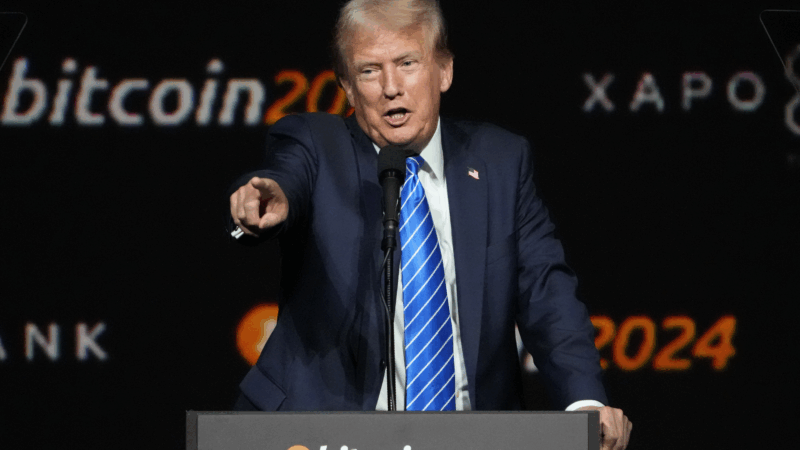Trump and Xi talk on the phone, their first call since the tariff war began
President Trump spoke by phone with China’s leader Xi Jinping on Thursday. This is their first known call since Trump began his second term with a focus on higher tariffs on imports of Chinese goods.
Trump, writing on his social media platform Truth Social, called the discussion a “very good phone call” that lasted about an hour and a half, in which the two men agreed to another round of trade talks and talked about potential state visits to each other’s respective countries.
Trump also hinted that China may be softening its export controls that have choked off certain metals that Europe and the United States both rely on to use in components integral to many technological and defense industry products
“There should no longer be any questions respecting the complexity of Rare Earth products,” Trump wrote.
China’s readout from the call said the two leaders also spoke about China’s stance on the democratic island of Taiwan.
“Xi Jinping pointed out that to course-correct the ship that is the Sino-US relationship, we should steer the rudder and set our direction. Especially important is to eliminate all kinds of interference and even sabotage,” China’s state news agency, Xinhua, reported.
Trump’s last known conversation with Xi was in January, before Inauguration Day, when the two leaders talked about a range of global issues including trade and the then-looming ban on TikTok.
At the time, Chinese goods entering the U.S. (and vice versa) faced an average customs levy of around 20%, most of which was a holdover from tariffs imposed during Trump’s first term in office and which the Biden administration declined to roll back.
But by April, a series of escalating tariffs had brought trade relations between the two countries to a new precipice.
Trump had started the trade war in February by applying a new 10% tariff — a number that climbed as high as 145% by April, with Beijing retaliating with tariffs of its own.
A breakthrough came in early May, when the two countries held bilateral trade talks in Geneva. They agreed to a 90-day pause on most of their levies. The U.S. lowered its rate to 30% on Chinese goods, and China cut its tariffs to 10%.
But more recently, Washington and Beijing accused each other of breaking the Geneva agreement. “But I’m sure that I’ll speak to President Xi, and hopefully we’ll work that out,” Trump told reporters at the White House on Friday.
“After the Geneva talks, China seriously implemented the agreement. The U.S. should seek truth from facts when looking at the progress made and withdraw the negative measures taken against China,” China’s readout said of Xi’s phone call with Trump.
During Trump’s first trade war with China in 2020, trade negotiators with the Trump administration agreed to a “phase one” trade deal with China that called for Beijing to purchase an additional $200 billion in American goods over a two-year period, when compared to a 2017 baseline. Due to the COVID pandemic and dropping demand, China never fulfilled most of those promised purchases.
Trump last met with Xi in June 2019 on the sidelines of a G20 meeting in Japan. A planned U.S. state visit to China in 2020 never materialized because of the pandemic. Since taking office for this second term, Trump has said that he would be willing to travel to China to meet with Xi.
In this Icelandic drama, a couple quietly drifts apart
Icelandic director Hlynur Pálmason weaves scenes of quiet domestic life against the backdrop of an arresting landscape in his newest film.
After the Fall: How Olympic figure skaters soar after stumbling on the ice
Olympic figure skating is often seems to take athletes to the very edge of perfection, but even the greatest stumble and fall. How do they pull themselves together again on the biggest world stage? Toughness, poise and practice.
They’re cured of leprosy. Why do they still live in leprosy colonies?
Leprosy is one of the least contagious diseases around — and perhaps one of the most misunderstood. The colonies are relics of a not-too-distant past when those diagnosed with leprosy were exiled.
This season, ‘The Pitt’ is about what doesn’t happen in one day
The first season of The Pitt was about acute problems. The second is about chronic ones.
Lindsey Vonn is set to ski the Olympic downhill race with a torn ACL. How?
An ACL tear would keep almost any other athlete from competing -- but not Lindsey Vonn, the 41-year-old superstar skier who is determined to cap off an incredible comeback from retirement with one last shot at an Olympic medal.
Trump promised a crypto revolution. So why is bitcoin crashing?
Trump got elected promising to usher in a crypto revolution. More than a year later, bitcoin's price has come tumbling down. What happened?







